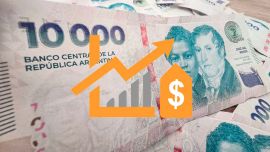Everyone calls her Toni.
Mothers take selfies of her with their children, and street hawkers push bracelets into her hand as presents. Artists sketch her portrait and post them to social media. TV networks vie for interviews and run profiles asking, “Who is Maria Antonieta Alva?”
The answer: She’s the 35-year-old finance minister of Peru steering an ambitious recovery package during a devastating pandemic, and she is winning praise for its generosity to small businesses and ordinary citizens.
“From a Latin perspective, Peru is a clear leader in terms of macro response,” said Ricardo Hausmann, a Harvard economist who was Alva’s professor and is leading a team of experts advising Peru and 10 other countries on mitigating the effects of coronavirus. “You could have imagined a very different outcome if Toni weren’t there.”
Appointed only last October, Alva is increasingly seen as a central figure in President Martín Vizcarra’s Cabinet, part of a rising generation of new leaders, and spends a great deal of time explaining public policy to a nervous public.
“She’s very good at communicating and that’s become much more important in the current context,” said Carlos Oliva, Alva’s predecessor in the post.
While Alva’s the only woman, she is part of a group of millennial finance ministers in the region, including Argentina’s Martin Guzman, 37, the Dominican Republic’s Juan Ariel Jimenez, 35, and Ecuador’s Richard Martinez, 39.
These aren’t easy times to oversee policy and it remains to be seen whether Alva survives. Some economists forecast a drop in GDP of more than 10 percent this year, the worst in decades, along with mass unemployment. She also has to contend with a populist agenda from the congress (where the government has no representation) that undermines the ministry’s, with elections less than a year away.
Her office said Alva wasn’t available for an interview.
Back to Growth
Alva’s initial focus was on reversing a slump in government infrastructure outlays by helping regional and local authorities spend faster, which led to a record increase in public investment. She wanted to reduce deficits in health, education and infrastructure, and get Peru back to growth after a decade-low 2.2 percent rate last year.
Since the pandemic broke - and it has hit Peru especially hard despite an early severe lockdown - her focus switched to containment, including aid for families and businesses, and preparing for a reactivation with this month’s reopening.
The daughter of Jorge Alva, a civil engineer who’s rector of the Universidad Nacional de Ingenieria (and a former teacher of Vizcarra), Alva has said she was exposed to the extreme poverty in Peru as a child when she accompanied her father on visits to its hinterland, and was determined to change things.
In a region known for its machismo, where female accomplishment is often largely seen through the prism of motherhood, Alva cuts an unusual figure, decked out in no-nonsense clothes and a distinctive piece of jewellery: a gold necklace with a pendant in the shape of Peru.
“She’s strong but not aggressive,” observed Patricia Zarate, head of polling at the Institute of Peruvian Studies. “She shows it through her work. It’s a different type of female empowerment.”
‘Just Machismo’
Some sneered at her ministerial appointment, saying she was there because she was someone’s daughter rather than because of her years in public finance. “It’s impossible not to think this is just machismo,” she said at the time. “If I were a man, that wouldn’t necessarily have been called into question.”
Alva attended a Peruvian university and then got a masters in public administration from Harvard in 2014. She spent most of the past decade working for the government in public planning and expenditure, including two years overseeing the country’s US$52-billion national budget.
Just months into her ministerial tenure, epidemiologists presented the government with a dilemma - lock down the population, including millions of shopkeepers, artisans and street sellers who live hand-to-mouth, or the health system risks collapsing under the strain of virus patients.
After consulting economists in Peru and overseas, she negotiated with cabinet colleagues to build a consensus for an array of solutions including cash handouts, payroll subsidies and government-backed business loans, none of which had been tried before in Peru.
“It’s been her push within the government that has led to such a clear articulation of the measures and the response,” said Jaime Reusche, an analyst at Moody’s Investors Service.
Two weeks ago, Peru sold US$3 billion of bonds in the international market at record low rates in a show of investor confidence.
Country of Paradoxes
Peru, with 32 million inhabitants, is a country of paradoxes. It has internationally recognised economic institutions and large foreign reserves, yet health care and education are among the most under-funded in the Americas.
As a student Alva was troubled by those contradictions and by ongoing inequality and poverty, said Enrique Vasquez, who taught her at Universidad del Pacifico in Lima. While studying, she co-founded a charity to help poor children attend university and started a public-policy debate group. Upon graduation, she went to the Finance Ministry.
She attended Harvard on scholarship and spent two months in India studying educational opportunities for girls. She returned to Peru to work at the Education Ministry, becoming head of planning and budget, before returning to the Finance Ministry to oversee the budget and a team of more than 150 people.
It hasn’t been all smooth sailing as a minister. For many, the cash handouts are arriving too slowly, meaning the lockdown has left them with no income, food or shelter. As the virus digs deep, thousands who’ve lost jobs are leaving Lima and returning to their home provinces in desperation.
In February, the chairman of Peru’s state oil company, Petroperu, quit after calling Alva stupid in a taped, expletive-laden conversation, for not authorising US$1.5 billion in financing. Days later, a group of university students draped banners over 18 highway bridges supporting Alva.
Last week, there were rumours on social media of her resignation amid claims that her family was benefiting from the rescue package. She denied the resignation and said her finances were publicly available online.
Vasquez, the professor, recalled a conversation he had with her when she was a student. “I said to her, ‘Toni, I hope one day you get the chance to be president of Peru. But you’re going to need to be minister first.’ She just smiled.”
by John Quigley, Bloomberg



















Comments